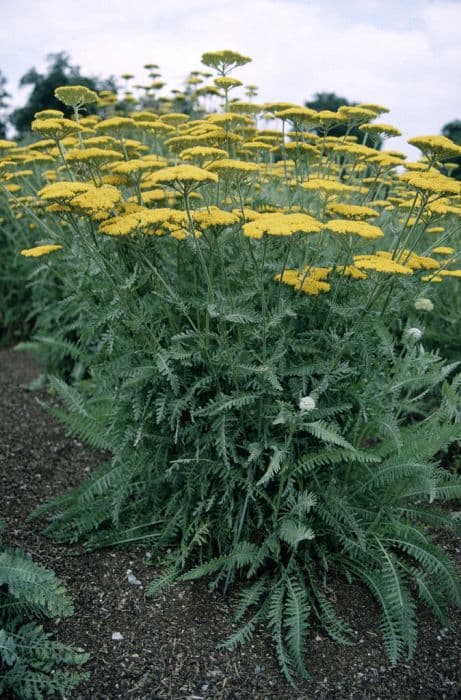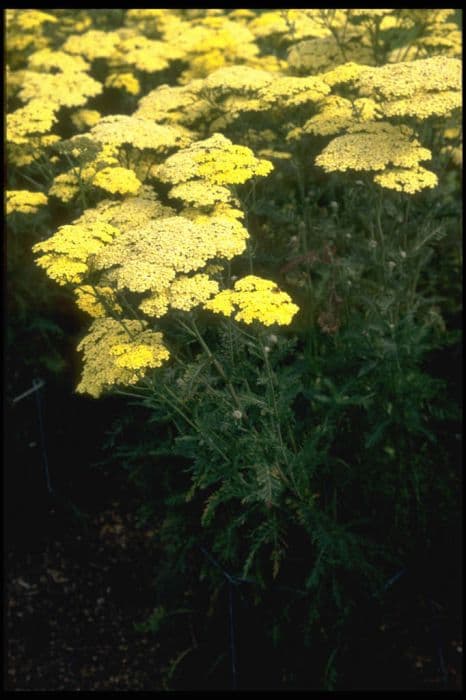Dahlia Dahlia 'Gallery Vincent' (PBR) (Gallery Series) (D)

ABOUT
Dahlia 'Gallery Vincent' is a strikingly ornamental bloom known for its vibrant appearance and lush flowers. The plant features an abundance of blooms which are a standout feature of the cultivar. Its flowers are characterized by a warm, rich hue, often described as a fiery orange-red color with layered, broad petals that give the blossom a full and robust look, which are quite showy and add a splash of intense color to any garden setting. The foliage of Dahlia 'Gallery Vincent' provides a lush backdrop to the vivid flowers, with deep green leaves that have a slightly serrated edge, offering a textural contrast to the softness of the petals. The leaves are carried on sturdy stems that stand erect, giving the plant a robust and healthy physique. Overall, the appearance of Dahlia 'Gallery Vincent' is a celebration of color and form, making it a favorite among gardeners looking to add a pop of color and drama to their floral arrangements or garden beds. With careful attention and maintenance, this plant is sure to be a showstopper wherever it is planted, thanks to its striking flowers and vibrant colors.
About this plant
 Names
NamesFamily
Asteraceae
Synonyms
Garden Dahlia, Georgina
Common names
Dahlia 'Gallery Vincent'
 Toxicity
ToxicityTo humans
Dahlias, including the 'Gallery Vincent' variety, are generally not considered toxic to humans. There is no widespread documentation of toxicity and they are not known to cause serious harm if ingested. However, as with any non-food plant, individual sensitivity can vary and some people might experience mild gastrointestinal discomfort or an allergic reaction after ingesting parts of the plant or from handling it. It's always advisable to refrain from eating ornamental plants and to supervise children to ensure they do not consume plant material.
To pets
Dahlias, including the 'Gallery Vincent' variety, are typically not toxic to pets such as dogs and cats. There is no significant evidence suggesting that these flowers pose a serious threat if ingested by pets. That said, every animal can react differently, and some might experience mild gastrointestinal upset such as nausea, vomiting, or diarrhea if they eat parts of the dahlia plant. It is always prudent to monitor pets and keep ornamental plants out of their reach to prevent potential digestive issues.
 Characteristics
CharacteristicsLife cycle
Perennials
Foliage type
Deciduous
Color of leaves
Green
Flower color
Purple
Height
1-2 feet (30-60 cm)
Spread
1-2 feet (30-60 cm)
Plant type
Bulb
Hardiness zones
8
Native area
Mexico
Benefits
 General Benefits
General Benefits- Vibrant Colors: Provides a burst of color with its vivid blooms that can enhance the aesthetics of any garden or landscape.
- Compact Growth: Ideal for small spaces due to its dwarf nature, making it suitable for borders, containers, or small gardens.
- Long Blooming Season: Offers a prolonged display of flowers from early summer until the first frosts, giving gardens extended interest.
- Attracts Pollinators: Attracts bees and butterflies, supporting the local ecosystem and promoting biodiversity.
- Low Maintenance: Relatively easy to care for once established, requiring minimal upkeep beyond regular watering and occasional feeding.
- Cut Flower Use: Ideal for cut flower arrangements due to its sturdy stems and long-lasting blooms, adding beauty indoors as well.
- Propagatable: Can be easily propagated from cuttings or tubers, allowing gardeners to create more plants for their space or to share with others.
 Medical Properties
Medical PropertiesThis plant is not used for medical purposes.
 Air-purifying Qualities
Air-purifying QualitiesThis plant is not specifically known for air purifying qualities.
 Other Uses
Other Uses- Dahlia tubers can be used for their starch content in the textile industry for stiffening fabrics.
- These flowers, when dried, can serve as an organic dye source for natural fabric coloring.
- As a subject in photography, the dahlia's intricate petals and vivid colors make it a popular choice for floral macro photography.
- The Dahlia 'Gallery Vincent' can be used as a vibrant natural confetti at weddings and celebrations.
- In the art world, dahlia blooms often serve as inspiration for painters and illustrators who admire their complex form and array of colors.
- Culinary uses include crystallizing petals for edible decorations on cakes and desserts.
- Gardeners may use the Dahlia 'Gallery Vincent' to create natural borders or patterns in ornamental landscaping projects.
- The stems of dahlias can be used in basket-weaving, taking advantage of their strength and flexibility.
- Insect hotels crafted from hollow dahlia stalks can provide a natural habitat for beneficial insects like solitary bees.
- Dahlia blooms can be pressed and preserved in glass frames or used in crafting, such as in homemade paper or bookmarks.
Interesting Facts
 Feng Shui
Feng ShuiThe Dahlia is not commonly used in Feng Shui practice.
 Zodiac Sign Compitability
Zodiac Sign CompitabilityThe Dahlia is not used in astrology practice.
 Plant Symbolism
Plant Symbolism- Elegance and Dignity: The Dahlia 'Gallery Vincent', with its intricate petals and sophisticated bloom, symbolizes the poise and grace that one carries within.
- Commitment and Bond That Lasts Forever: Dahlias are often associated with lasting commitment and evergreen relationships due to their perennial nature.
- Change and Variety: As dahlias come in various shapes and colors, they often represent diversity, change, and a wild array of experiences in life.
- Inspiration and Creative Spirit: The vibrant and distinctive nature of the Dahlia 'Gallery Vincent' can symbolize an inner spark of creativity waiting to be expressed.
- Inner Strength: Dahlias have strong stems that hold the blooms upright, which can symbolize the inner strength required to stand tall in the face of adversity.
 Water
WaterDahlias, including the Gallery Vincent, should be watered deeply approximately two to three times a week, depending on weather conditions. They prefer consistently moist soil, but ensure that the area has good drainage to prevent root rot. During hotter weeks, it is advisable to check the soil moisture level more frequently as they might require more water. Generally, apply about an inch of water, making sure it soaks the soil to a depth of at least 6 inches. When using a watering can or hose, aim for the base of the plant to minimize wetting the foliage which can lead to fungal diseases.
 Light
LightDahlias thrive in an environment with full sun exposure for at least 6-8 hours a day. The Gallery Vincent should be placed in a spot that receives direct sunlight for the majority of the day to encourage optimal blooming. However, in extremely hot climates, afternoon shade can be beneficial to prevent scorching of the blooms.
 Temperature
TemperatureDahlias like the Gallery Vincent do well in warm conditions, with temperatures ranging between 60 and 75 degrees Fahrenheit being ideal. They are not frost-tolerant and should be protected or lifted from the ground if temperatures are expected to drop below 50 degrees Fahrenheit. During the growing season, maintaining temperatures within this range will promote healthy growth and flowering.
 Pruning
PruningPruning dahlias like the Gallery Vincent is important for encouraging strong stem growth and more prolific blooming. Deadhead spent flowers regularly to promote continuous flowering. In early summer, pinch out the growing tips once the plant has reached about 16 inches in height to encourage bushier growth. The best time for major pruning is early to mid-summer, but light pruning and deadheading can be done throughout the blooming season.
 Cleaning
CleaningAs needed
 Soil
SoilDahlias thrive in well-draining, fertile soils with a slightly acidic to neutral pH of about 6.5 to 7.0. A good mix for Gallery Dahlia includes equal parts of garden soil, peat, and perlite or sand to ensure proper drainage. Adding compost or well-rotted manure will provide essential nutrients for optimal growth and flowering.
 Repotting
RepottingDahlias, including Gallery Dahlia, should be repotted annually. The best time to repot is in the spring when new growth begins. Lift the tubers from the soil, divide if necessary, and replant in fresh potting mix to ensure the plant remains healthy and vibrant.
 Humidity & Misting
Humidity & MistingGallery Dahlia prefers moderate humidity levels, as too high humidity can promote fungal diseases. Aim for a humidity level between 40% to 60% for optimal growth. Ensure good air circulation around the plants to help maintain appropriate humidity.
 Suitable locations
Suitable locationsIndoor
Ensure bright light, well-draining soil, and moderate temps.
Outdoor
Plant in full sun, well-draining soil after frost risk.
Hardiness zone
8-11 USDA
 Life cycle
Life cycleDahlias 'Gallery Vincent', like other dahlias, begin their life cycle as tubers planted after the last frost of the season. They sprout and grow quickly into lush, bushy plants with deep green foliage. Throughout the summer, they continuously produce showy, vibrant flowers, attracting pollinators until the first frost. As temperatures drop, the above-ground foliage dies back, signaling the end of the flowering stage. The tubers can be left in the ground in milder climates where the soil doesn't freeze, or they must be dug up, stored during the winter, and replanted the following spring. This perennial cycle repeats annually, with proper care extending the life of the tubers for several years.
 Propogation
PropogationPropogation time
Spring-early summer
The most popular method of propagation for Dahlia 'Gallery Vincent' is through division of tubers, which is best done in early spring as the soil begins to warm. This involves carefully lifting the tuber clumps from the ground after the foliage has died back and the first frost has occurred. The tubers should be allowed to dry for a few days in a frost-free location. Once dried, divide the clump so that each section has at least one eye, which is a point from where new growth will emerge. The divisions can then be planted about 4 to 6 inches (10-15 cm) deep within the soil, spaced approximately 18 to 24 inches (45-60 cm) apart, ensuring proper room for growth. It is important for ensuring the eyes are facing upwards and that the soil is well-draining to prevent rot. Water the tubers gently upon planting and wait for the growth to start as temperatures rise.









